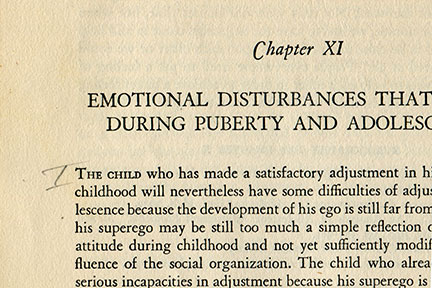 |
||
Oliver Spurgeon English and Gerald Pearson, Emotional Problems of Living, 1941 By inserting "I" for "The child" in this paragraph we are given to understand something about the relationship of the reader to the sentences at hand. Still, to do so in a library copy is beyond me. Some of us feel that anything we use or touch becomes our own. Perhaps the reader, overwhelmed by the recognition of their self in this paragraph, felt obliged to claim it as his own. Perhaps her own. There's too little handwriting here to tell the reader's sex. Writing in a book, another's book, in this way feels somehow male to me. Like a public pissing. An exertion of the self in a conversation he has no right to. A kind of mansplaining, as Rebecca Solnit, might suggest. Or is it an entering into a conversation with the text? The sample is too small to track. And what a book title! Its sprawl and grandeur is beyond measure: yes, we understand living is a minefield of emotional problems. What are our lives but a series of emotional disturbances? Why else would we read if not to be disturbed? If not to be displaced? If not to be erased, at least for an hour, and set under a spell?
|
||
